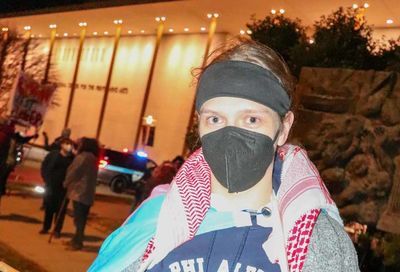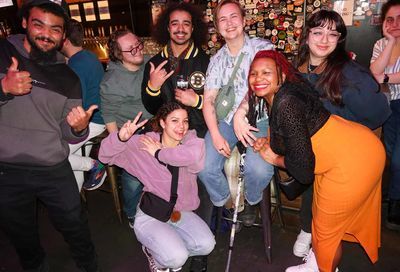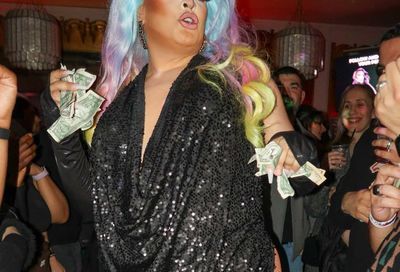Cultural Crossroads: An interview with LHP’s David Perez
LHP's David Perez on coming out, finding self-acceptance and the importance of forging a historical heritage within a broader culture

MW: How did you first find out your friend Daniel was gay? Because you said previously you didn’t know what that meant.
PEREZ: So he lived on 17th Street, had a house party, a bunch of his grad school friends were there, a bunch of his colleagues from work. So Daniel was there hosting the party, at one point, I noticed that on the side of his face was some face paint, and it was smudged. And I realized that his boyfriend had the same smudge. And then I think they kissed, and I was like, “Oh, they’re boyfriends.” I don’t know if I was just oblivious or what. He was just my friend in all the study groups, and I thought he was great, and we’d have social events together. And I was like, “Oh, that’s interesting,” in the back of my mind. And several times I had almost come out to him. Because he would invite me sometimes to get a drink, and he would give me two options, JR.’s or a straight bar. And then I would be like, “OK, that’s fine.” [Laughs.]
The first actual club I went to was Chaos, which doesn’t exist anymore, and that was because our grad school group, again, they were like, “Daniel’s the one gay guy in our group, so let’s support him. We always go to straight clubs. Let’s go to a gay club.” So I was there as an ally in disguise. I went to Cobalt one time with Daniel. I remember walking in and seeing shirtless bartenders, and being like, “I’m totally gay. They’re so hot.” And so he was kind of exposing me a little bit. He and his boyfriend said they knew that I was gay, but that I had to be ready to tell them when I was comfortable with it. And then I did a study abroad in Chile, and I was G-chatting them different questions, trying to figure things out, and finally, when I came back in August, I was ready to come out.
MW: Did you start dating right away, or did it take a while for you to become comfortable with the idea? Because it’s one thing to say, “I’m gay,” and it’s another to make yourself vulnerable to another person in intimate situations.
PEREZ: I think once I told everyone I was comfortable. I dated for two or three months. That was my first boyfriend. I think that year, I dated another guy during the summer months, because I was trying to find my way in the dating world.
The first scary thing was kissing someone. Because I tried to date a couple of women, and had taken one woman in grad school on a date to Adams Morgan. In college, when I had asked people on a date, they were like, “No, you’re my friend.” So I had always tried to tell girls I liked them, but they would say no. I remember, even in middle school, I wrote a poem for a girl, and left it in her backpack, and she didn’t ever speak to me again. So I had never kissed anyone, I had never had any dating experiences.
I remember once somebody wanted to kiss me, and I was like, “All right. Let me figure it out.” And also, at this point, I was asking myself did I really like guys, because I had never had any contact physically with them.
MW: How was that first kiss?
PEREZ: [Laughs.] Awful. I don’t really like to speak about it. It was an awkward experience. That wasn’t magical or anything.
MW: When did you finally come out to your family?
PEREZ: I came out to my friends in 2006, in the summer, and then I went home at Christmas, in the San Diego area. They were great. I mean, there was crying. It was emotional for my family, but I felt like it was a slow process. There’s a coming out process for the family, and for myself, to be open about sharing everything with them. They’ve been very supportive and have treated me great, so I’ve been very thankful to have that support.
When I told my parents, my mom started crying and my dad’s face got really serious. His face dropped — I felt like he was disappointed. They said, “Why would you be afraid to tell us?” And I said, “I was afraid that you wouldn’t support me,” and they said, “Oh, you should never think that. You’re our son, we love you.” And they asked, “Do you have a special friend?” And my mom said she couldn’t be ready if I had a “special friend” yet. The thing I thought in my head was, “I’m really happy they reacted this way.” That’s the values they had taught me, to unconditionally love your family and others. So they were walking their talk.
Then I went upstairs. I tell my sister, she’s in her bedroom, hanging out. She cries, too, and tells me she loves me. Then I go to my brother’s room — he was in high school and seven years younger than me — and he’s playing video games, or whatever, and I say, “Can I talk to you, Jonathan?” And he’s like, sure. So I told him, and he says, “All right.” Typical high school kid. Not interested that much.
Prison Break: An interview with Selenis Leyva from Orange is the New Black
MW: You say your family is evangelical. Are they Biblical literalists?
PEREZ: The church is the Evangelical Covenant Church where they worship. My sister’s in seminary right now, she’s becoming a pastor, doing her internship in Nebraska. They’re very supportive of me. I don’t know if in their church they could have a gay pastor. I don’t know the details. But personally, they don’t treat me differently. And that’s why I’m so glad for their support. They always talked about loving your family and each other unconditionally, and supporting you, and they really lived that. When I came out to them, they just loved me, 100 percent. That’s very reassuring, and a blessing to have that positive experience with them.
MW: You personally came from a very religious background. Even with growing acceptance from religious communities, do you think it’s still a struggle to balance one’s queer identity with one’s religious identity?
PEREZ: Sure.
MW: Do you personally struggle with that, still, to this day?
PEREZ: I do not.
One of the initiatives I did help on was creating a faith space. One of my mentors from Georgetown, a professor there, Father Joseph Palacios, he was on that committee as well. He had held a gay Catholic group, Grupo Dignity Latino Washington. And then thWhen I came back from that vacation in California, the next place I went was a service at St. Thomas. And that was really special for me. It was a small service, but I took communion there, we had a reading from the Bible. I just felt like I was getting a big virtual, spiritual hug from God, saying, “You’re accepted here, your full self, you’re loved in this place.” And there were the folks from MCCDC’s Spanish ministry, which they renamed UNIDOS. So we all came together and said, “All the other Prides have a faith service. Why don’t we have a faith service?” So we started planning and created a committee, and about two or three years ago, we held the first Latino Pride Spanish-language faith service. So now that’s turned into a monthly celebration, hosted by Grupo Dignity Latino Washington and UNIDOS, and it’s just a unique space that’s lacking in the community.
They’ve been really fun services. The preacher who comes, Rev. Alberto Najera from Norfolk, he wore one year [at the Pride service] a golden outfit of traditional robes. He had these Lady Gaga high heel gold things that were tools in his sermon. One year he played Lady Gaga, one year he played another pop song. He was like, “This is the Pride service.” But he’s speaking in Spanish. He’s hilarious. But it was so neat because I could see other people in the crowd getting touched by his message. But he was also fun, and he had these outlandish high heels on, and it was just such a moving experience.
MW: How did you become involved in Latino groups, specifically the Latino GLBT History Project?
PEREZ: When I finished grad school, I was looking for groups to get involved with, because I had finished all that studying, and I had some more time. So I saw either online or in Metro Weekly some kind of listing about Latino Pride. This would have been in 2008. So I went to the Human Rights Campaign, which is where it was, and I remember Laura Esquivel was a panel moderator. She was working at the time for the Gay & Lesbian Victory Fund as a political director. She’s a consultant now, and has had many different roles in the Latino and queer movements. And she really impressed me.
Laura told this story about her struggle. Originally, she was in L.A. in the farmworkers’ movement, and she talked about the challenge of being out and lesbian in that movement. And when she was in LGBT movement spaces, the challenges of celebrating Latino expressions of identity. And she was talking about the 1987 LGBT March on Washington, and Cesar Chavez, who’s a farmworkers’ leader, was one of the folks leading the parade, as well as someone from the women’s movement. And before Cesar Chavez went to speak on stage, Laura was talking with him and telling him the struggle of not knowing whether she should be fighting for farmworkers’ rights or LGBT rights, and what is she supposed to do? And he said, “You don’t have to choose. You can do both.” And then she started crying telling her story, and just saying how that really inspired her to be her full authentic self in all these spaces. And that was to me really inspiring. I thought, “I would really like to know this woman.”
I had gone to a couple of LHP events, and Jose Gutierrez asked me one day, “Would you like to volunteer with our group?” And I said, “Oh, sure. That sounds great. I’d be happy to help.” I brought my friend Alonso with me, and it was a basic volunteer job, but there was an exhibit at the Historical Society of Washington in the fall of 2009, and it was the first edition of Heroes Latinos LGBTQ. And there were about 40 photos or so, the first year, possibly, of LGBT Latino leaders in black and white, with their nameplates. That was my job, and so I made these little nameplates and put colored backgrounds around these 40 photos on display at the Historical Society of Washington, D.C. So that was my first volunteer job, Jose Gutierrez kept inviting me back to the meetings, and asking me to get more involved.
I think it must have been about 2010 when I first joined the board of LHP. We helped organized D.C. Latino Pride that year at Charles Sumner School, and that’s how I sort of became involved. I found it an exciting organization and place to be. Being as a young child and never knowing anyone who was gay, until later in life, I was really excited to have that space and be out and celebrate my full self. So finding this group that makes
Support Metro Weekly’s Journalism
These are challenging times for news organizations. And yet it’s crucial we stay active and provide vital resources and information to both our local readers and the world. So won’t you please take a moment and consider supporting Metro Weekly with a membership? For as little as $5 a month, you can help ensure Metro Weekly magazine and MetroWeekly.com remain free, viable resources as we provide the best, most diverse, culturally-resonant LGBTQ coverage in both the D.C. region and around the world. Memberships come with exclusive perks and discounts, your own personal digital delivery of each week’s magazine (and an archive), access to our Member's Lounge when it launches this fall, and exclusive members-only items like Metro Weekly Membership Mugs and Tote Bags! Check out all our membership levels here and please join us today!





















You must be logged in to post a comment.